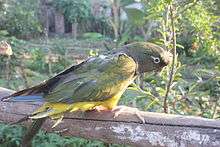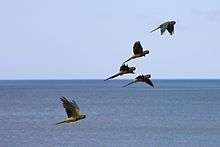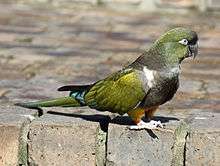Burrowing parrot
The burrowing parrot (Cyanoliseus patagonus) is a bird species in the parrot family. It belongs to the smaller long-tailed Arinae (macaws and conures). It is also known as the Patagonian conure and some authorities call it the burrowing parakeet.[2] The burrowing parrot belongs to the monotypic genus Cyanoliseus,[3] but the species is not monotypic, having several subspecies.
| Burrowing parrot | |
|---|---|
 | |
| Scientific classification | |
| Kingdom: | Animalia |
| Phylum: | Chordata |
| Class: | Aves |
| Order: | Psittaciformes |
| Family: | Psittacidae |
| Genus: | Cyanoliseus Bonaparte, 1854 |
| Species: | C. patagonus |
| Binomial name | |
| Cyanoliseus patagonus (Vieillot, 1818) | |
It is mainly found in Argentina. A very much reduced population still survives in Chile, and migration of some Argentine populations to Uruguay has been reported for the winter. Sometimes, strong westerly winds bring some individuals to the Falkland Islands.
Its natural habitat is the arid bush steppe community known as the Monte Desert.
The burrowing parrot has a monogamous mating system with very strong biparental care. Genetic testing has recently shown that this species is one of a few animals that is genetically monogamous in a socially monogamous mating system. Nest parasitism is not known to occur in this species. The Patagonian conure has eyelashes, a distinctive feature among birds.
Subspecies

These four subspecies are currently known:[4]
- Cyanoliseus patagonus andinus
- Cyanoliseus patagonus byroni, greater Patagonian conure
- Cyanoliseus patagonus conlara
- Cyanoliseus patagonus patagonus, Lesser patagonian conure

The larger the red abdominal patch in males, the more attractive the bird is to females. In a study of around 40 pairs, the males with the largest and most intense red patches paired with the females with the same. This carries down so that pairs tend to have the same-sized patch. Nestlings from males with large, more intense patches also grow faster and weigh more.[5]
Suitability as pets
Patagonian conures are among the most affectionate, social birds and make fantastic pets, but the decision should not be taken lightly when deciding to adopt one. Patties, as their admirers call them, are capable of mimicking simple words and phrases. The Patagonian conure is capable of integrating completely with an entire family, unlike many birds who will bond with only one person. One issue with the Patagonian conure is that it is extremely loud. Living in an apartment with any conure may be inconsiderate to neighbors, but Patagonians are the largest and loudest. Also, Patagonians require a great deal of attention and become ornery and spiteful if stuck in a cage with no social interaction. The Patagonians need stimulating toys with many colors to pass time when alone.
References
![]()
- BirdLife International (2012). "Cyanoliseus patagonus". IUCN Red List of Threatened Species. 2012. Retrieved 26 November 2013.CS1 maint: ref=harv (link)
- Clements, J. F., T. S. Schulenberg, M. J. Iliff, D. Roberson, T. A. Fredericks, B. L. Sullivan, and C. L. Wood. 2016. pene
- v2016. Downloaded from http://www.birds.cornell.edu/clementschecklist/download/
- Forshaw, Joseph M.; Cooper, William T. (1981) [1973, 1978]. Parrots of the World (corrected second ed.). David & Charles, Newton Abbot, London. ISBN 0-7153-7698-5.
- Animal-world.com
- Cameron, Matt,Parrots: The Animal Answer Guide, p 36, ISBN 978-1421405445
External links
| Wikimedia Commons has media related to Cyanoliseus patagonus. |
- Burrowing Parrot Project
- Masello, Juan F.; Sramkova, Anna; Quillfeldt, Petra; Epplen, Jörg Thomas; Lubjuhn, Thomas (2002). "Genetic monogamy in burrowing parrots Cyanoliseus patagonus?" (PDF). Journal of Avian Biology. 33 (1): 99–103.
